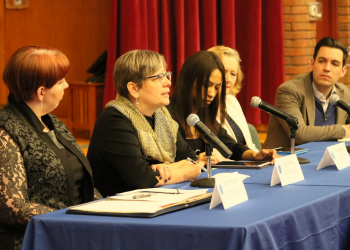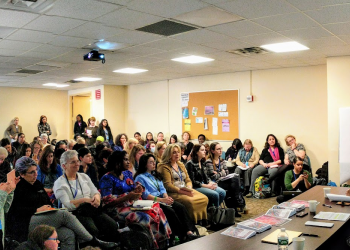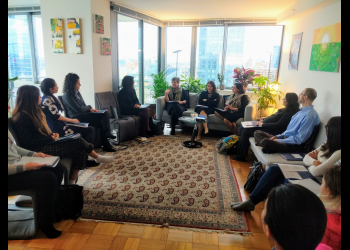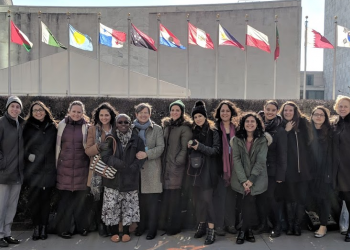Fostering Hope - the Role of Media in Advancing Gender Equality
Shining a light on stories that foster hope rather than sell despair can be difficult in the modern media landscape. Doing so challenges the notions that reality is static and intractable, that conflict and competition are inevitable features of human life.
This message, delivered at a side event attended by over 100 participants and hosted by the Bahá'í International Community’s United Nations Office at the 62nd United Nations Commission on the Status of Women, framed the discussion about the role media can and does play in society. Delegates with experience in offering alternatives to dominant trends in the media--offering counternarratives to beliefs and assumptions about human nature, about what makes a story compelling, and about audience appetites--were invited to join the BIC as it explores questions around the role of media in society. The review theme of this year’s Commission was “participation in and access of women to the media, and information and communications technologies and their impact on and use as an instrument for the advancement and empowerment of women.”
“In the arena of gender equality, the media can be an agent for positive change, so long as the portrayal of women, and the access to the means of creation, is truthful and just,” offered Saphira Rameshfar, a representative of the Bahá'í International Community to the United Nations in her introductory remarks at the side event.
Ms. Rameshfar was joined by a panel of women with a diverse range of experiences in the media. One panelist shared her efforts in using a community-based grassroots media initiative to develop film content which portrayed the challenges faced by a local community, embracing ideals which “tell stories of resilience and incredible strength.” Detailing the daunting nature of taking the first step, she stated, “if you don’t take action, then you won’t learn anything, so this is the time to actually take a step even knowing it won’t be perfect. After you act, you can reflect on that action, study the areas where you still have gaps, consult on next steps, and act again, incorporating new knowledge.” This approach, she added, “was really liberating” and allowed the group to learn together in a genuine and collective manner.
Another panelist, who works in a more traditional production company, provided some wisdom which has guided her career: “I worry sometimes that those in media may be losing hope in the power of this tool to effect real change … I know that it can. By focusing on constructive, unifying and cooperative undertakings, all kinds of media can demonstrate humanity’s capacity to work together to meet the enormous challenges facing it.”
“The goal of this engagement,” stated Ms. Rameshfar, “was to open the door for an ongoing dialogue about how the media in society can act as a force for the upliftment of peoples and the progress of humanity. The response we received demonstrates that there is an appetite for such a conversation.”
RURAL WOMEN
The priority theme of the CSW was “Challenges and opportunities in achieving gender equality and the empowerment of rural women and girls.” In that light, the BIC contributed a statement called “Beyond Mere Economics:A Moral Inquiry Into the Roots of Empowerment.” One of the key themes of the statement is the central role women and youth have played in advancing educational initiatives and spiritual frameworks through processes of capacity building.
In response to many of the issues brought to light at this year’s Commission, Ms. Rameshfar stated, “the CSW events demonstrated that, in addition to capacity building, we must find answers to the needs of this day. We need to determine solutions to problems never before faced, which will require answers never before arrived at. In so doing, we need to ensure that the experiences and perspectives of women and men - all of humanity - are heard, particularly in the context of individuals trying to better their lives in rural communities.”






